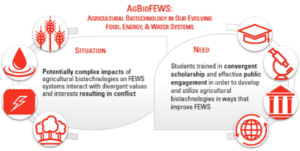 Professor Fred Gould, in collaboration with NC State’s Genetic Engineering and Society Center, directs the program in “Agricultural Biotechnology in Food Energy and Water Systems” (AgBioFEWS) that supports graduate students from diverse natural and social science disciplines through convergent approaches to training and research. Dr. Gould and his colleagues were awarded an approximately $3 million grant from NSF’s National Research Traineeship (NRT) for fellowships in this program. AgBioFEWS students work together from differing perspectives to examine current and potential future biotechnology products and their development pathways to assess if and how they can be used to improve FEW Systems for societal benefit. The PIs have developed collaborations across the NC State campus and beyond to structure a program that builds teams of graduate students who are getting PhDs in specific natural and social sciences programs.
Professor Fred Gould, in collaboration with NC State’s Genetic Engineering and Society Center, directs the program in “Agricultural Biotechnology in Food Energy and Water Systems” (AgBioFEWS) that supports graduate students from diverse natural and social science disciplines through convergent approaches to training and research. Dr. Gould and his colleagues were awarded an approximately $3 million grant from NSF’s National Research Traineeship (NRT) for fellowships in this program. AgBioFEWS students work together from differing perspectives to examine current and potential future biotechnology products and their development pathways to assess if and how they can be used to improve FEW Systems for societal benefit. The PIs have developed collaborations across the NC State campus and beyond to structure a program that builds teams of graduate students who are getting PhDs in specific natural and social sciences programs.
Dr. Gould reported 17 NC State faculty engaged from five different colleges. The first cohort completed two group projects, one that utilizes databases to assess the impacts of genetic engineering and other agricultural practices on-farm biodiversity. The second project looks at what factors affect the research-to-product pipeline. The output from this second project is an article that was accepted for publication in Frontiers and is titled “Lessons for a SECURE future: Evaluating diversity in crop biotechnology across regulatory regimes”. The second cohort presented their group project at a GES colloquium at the end of the Spring semester of 2022. The title of the project is “Developing a Research Agenda for genetically engineered Carbon Capture and Sequestration Crops”. The third and final cohort is comprised of 12 students who represent 10 different PhD departments. The third cohort completed their first year of classes and worked intensively in summer 2023 on a project focused on the future of governance for transgenic and gene-edited plants and foods.
